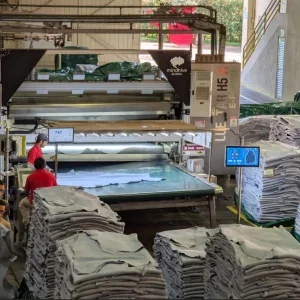Red rot is the acidic degradation of vegetable tanned leather resulting in acid attack on both the collagen protein fibres and the vegetable tannins. The leather gradually turns into a red powder and, at present, it is an irreversible process.
Yvette Fletcher, acting head of conservation at the Leather Conservation Centre – a major international centre for leather conservation, education and research housed at the University’s Park Campus – is working closely with Anne. She explained: ‘The problem is usually found affecting leather from Victorian times onwards. It was originally documented after leather chairs in the library of a London club, which was heated by coal fires and lit by gas lighting, started to deteriorate. The sulphur and nitrogen oxides from incomplete combustion reacted with the leather, causing de-tanning and gross breakdown of the material itself. It is understood that this is only one of many contributing factors.’
Lama studied her MSc in Leather Technology at the University’s British School of Leather Technology and is due to submit her PhD thesis in November, entitled ‘The Impact of the leather manufacturing process on bacterial growth in tannery effluent’.
The KTP Research Associate is eager to talk to conservators, archivists, librarians, bookbinders and anyone dealing with leather who may have come across red rot. She said: ‘I am collecting samples of old and new leather, with and without red rot, in order to carry out tests and find out more about the causes and how to cure it. Combating the problem would save so many pieces of history from crumbling away and being lost for ever.’
Anyone who would like to donate any leather samples to the red rot research can contact Anne at lcc@northampton.ac.uk.
Anne and fellow PhD student Arthur Onyuka, were also recently awarded funds by the Dr Dorothy Jordan Lloyd Memorial Trust, administered by the Northampton-based UK Leather Federation, to cover their travel expenses for the upcoming 30th IULTCS international conference in Beijing, China, 11-14 October 2009.
Onyuka will be presenting a full paper at the conference to and Lama will present a poster based on her PhD theses entitled ‘The impact of beamhouse processes on bacterial growth’.






